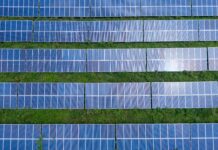Doug Young
After more than a year of antagonism, I’m happy to see that the voice of reason finally seems to be coming to the ongoing clash between China and the west in their prolonged dispute over Beijing’s state support for solar panel sector. Germany seems to be the driving force behind this welcome change in tone, following German Chancellor Angela Merckel’s remarks last week that she opposed anti-dumping tariffs on Chinese solar cells being proposed by the EU’s trade office. Merkel correctly realized that a trade war over solar panels wouldn’t benefit anyone, and could potentially deal a crippling blow to a sector that will be critical to the world’s future energy security.
Following that behind-the-scenes pressure from Germany and perhaps 1 or 2 other European leaders, the EU’s trade commission has suddenly backed down in its previously aggressive stance towards China in the dispute. Media are reporting that the EU’s trade commissioner has decided to impose an 11.8 percent punitive tariff rate on imported Chinese solar cells from Thursday this week, far lower than the 47 percent rate that was initially planned. (English article) But the rate would rise to the original 47 percent in 2 months if China and the EU can’t reach a settlement before then to resolve the matter.
The dispute centers around western claims that China unfairly supports its solar panel makers by giving them numerous economic advantages, including cheap loans, low-cost land and tax incentives. Those incentives led to a huge build-up of China’s sector over the last decade, which resulted in a massive oversupply that has sent the global industry into a prolonged slump over the last 2 years. As a result, many of the western firms that pioneered the technology have gone out of business, and most of China’s big players are only continuing to operate with support from Beijing. (previous post)
Unhappiness about Beijing’s strong support for its solar sector led the US to impose anti-dumping tariffs on imported Chinese solar cells last year, and the EU is preparing to take similar steps following its own investigation. In both cases, Beijing did little or nothing to try and resolve the matter to avert a crisis, even though it had plenty of time to try to intervene while the months-long investigations were occurring.
Last week Beijing finally got a little more proactive by sending a delegation to Europe to try and negotiate a settlement. But those talks quickly broke down due to lack of experience by the Chinese negotiators. (previous post) Shortly after that happened, Merckel came out publicly and said Germany opposed the sanctions, which appears to be the main driver for this sudden softening of the EU’s stance in the matter.
So the big questions become: What will happen next, and will the 2 sides be able to reach a settlement before August? My guess is that we’ll see the Chinese side send a new delegation to Europe in the next week or two, and that this time we’ll finally see some serious negotiations take place. Since it’s unlikely that China can dismantle its extensive state support for the industry so quickly, we’re more likely to see the Chinese companies agree to simply raise their prices to a level that is comparable with products from their European and North American rivals.
I would give this latest round of negotiations a good chance of success, perhaps at around 70-80 percent, since I think that both sides truly want to settle this matter without a trade war. If they do reach an agreement, that could become a template for similar talks with Washington that could perhaps result in the rollback of US tariffs, providing another major boost for the embattled sector.
Bottom line: A softening of Europe’s stance in its solar panel dispute with China means the 2 sides now have a 70-80 percent chance of negotiating a settlement to the matter.
Doug Young has lived and worked in China for 15 years, much of that as a journalist for Reuters writing about Chinese companies. He currently lives in Shanghai where he teaches financial journalism at Fudan University. He writes daily on his blog, Young´s China Business Blog, commenting on the latest developments at Chinese companies listed in the US, China and Hong Kong. He is also author of a new book about the media in China, The Party Line: How The Media Dictates Public Opinion in Modern China.






